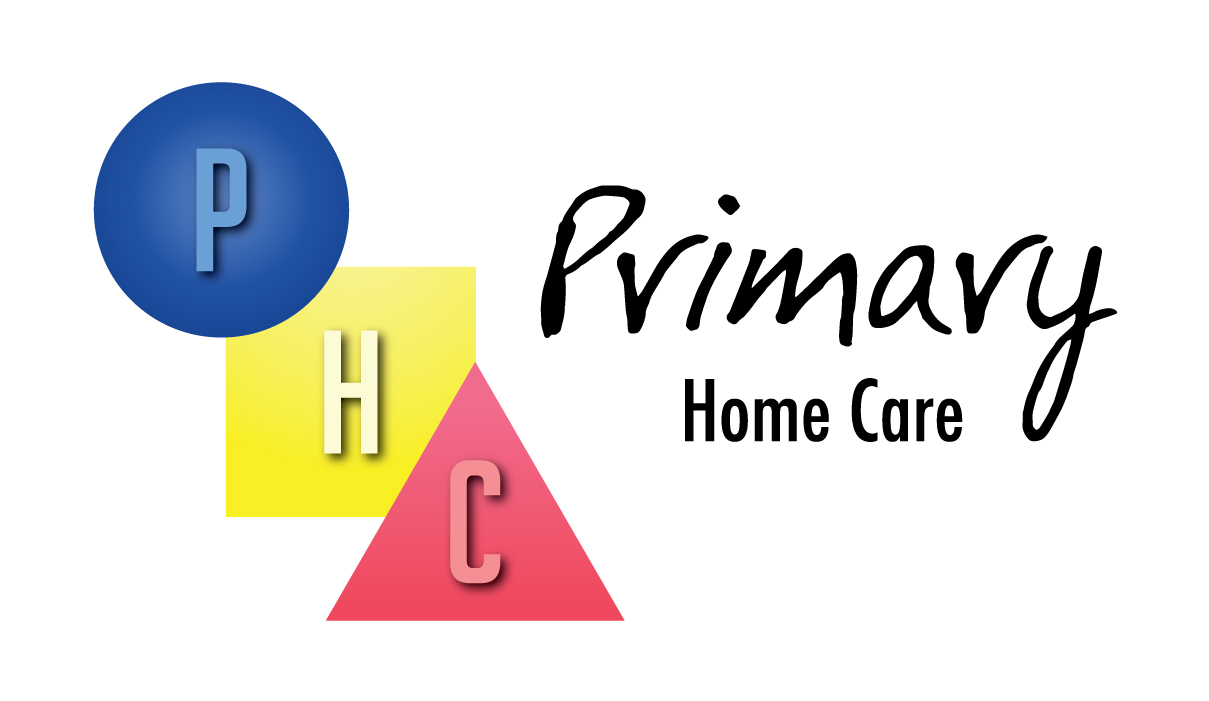Practices issued by the CDC (Center For Disease Control) in 1987 to reduce the spread of AIDS, Hepatitis B and other infections we may not even know of from one person to another, especially people who take care of other people.
Universal Precautions are rules about how you protect yourself from touching the bodily fluids from another person. This is important, because bodily fluids are how diseases like Hepatitis and AIDS are transmitted to another person.
When to Use them?
The rule is to ALWAYS use the Universal Precautions, because you often have no way of knowing if a person has a life threatening disease that you could catch.
Why Are Universal Precautions Important?
We take care of people who may have chronic (ongoing) illnesses, or who may be contagious (as in the case of the flu) meaning we could “catch” what they have.
#1 – When to wear gloves
By gloves we mean latex or vinyl hand protection. You can pick them up at the Primary Home Care office.
Gloves MUST be worn anytime you MAY come into contact with blood, body fluids, or mucous membranes.
Example of when to wear gloves would include helping client blow nose, or use the toilet.
Wash your hands or use hand sanitizer before you put on gloves…and of course after you remove them!
You should also wear gloves when:
- To cover your hands if you have cuts, scrapes or broken skin
- There is possible contact with soiled linen, feces, vomit, dressings or wound drainage, or you need to touch soiled clothing.
STOP! (get a pair of gloves from the front desk)
How to Safely Remove Gloves
- Remove a glove by grasping it below the cuff—and pulling it off, while wearing the other glove….do not touch your bare skin.
- Pull the glove down over your hand so it is inside out.
- Hold the glove you removed with the other glove.
- Reach inside the other glove and pull it down over the first glove.
- Discard gloves and wash your hands. This process can be confusing at first, if you have any questions ask us!
Review
Gloves are provided by the company to help protect Primary Home Care Caregivers. They are to be worn anytime a worker may come into contact with bodily fluids of another person.
Gloves are a barrier between YOU and the potentially infected client.
Universal precautions were developed in 1987 to prevent the further spread of the AIDS virus, and also Hepatitis. Today, they prevent us from contracting these and other unknown diseases.
#2 – When to use a face shield or mask?
A mask will protect your eyes, nose and mouth from splashes of another person’s bodily fluids which could contaminate you. Masks and face shields vary in style, if you need one, or have questions please call Primary Home Care and ask to speak to the nurse.
#3 – Gowns or Aprons?
Your work in the home is not likely to involve need of a gown over your scrubs, however do not hesitate to wear an apron or other protective clothing when completing tasks that may involve soiling/contaminating your street clothes.
#4 – If it’s wet, wash it!
Hands and any other part of your body which comes into contact with blood or bodily fluids MUST be washed immediately.
Wash your hands completely after removing and disposing of your gloves.
NOTE: Use clean gloves for each task, or set of related tasks.
Wash your hands after finishing work with each of your clients.
#5 – Managing Sharps
Be VERY careful to avoid nicks or cuts when shaving a patient, or brushing teeth etc.
DISPOSE OF SHARPS PROPERLY. IF THERE IS NO SHARPS DISPENSER AT THE HOME, MAKE ONE USING AN EMPTY METAL COFFEE CAN WITH A TIGHT FITTING LID, OR PLASTIC MILK JUG W/CAP.
#6 – Doing CPR
If you are certified to do CPR or rescue breathing, know that a mouth barrier can help protect you from communicable diseases.
#7 – Avoid contact with lesions or sores
Do not touch a client’s skin if they have open wounds or lesions.
DISCUSS THE SITUATION WITH THE Primary Home Care Nurse.
Caregiver’s Role:
Other things you can do:
- Double glove if you suspect a person is infected with hepatitis, HIV or AIDS.
- Properly dispose of sharps
- Be aware of your surroundings, and what you come into contact with.
COMMON SENSE
These guidelines are used everywhere, “universal” however there may be additional precautions you should take. Common Sense should be your guide in any home care situation.
Infection Control
When we talk about Universal Precautions, we generally are concerned about very serious illnesses like Aids and Hepatitis. However, Universal Precautions along with other practices can discourage the spread of all disease. Because we work with people who may be elderly, sick, disabled or who have compromised immune systems, we have a special responsibility to make sure we have taken all practical precautions.
It starts with Washing Your Hands!
Immunity
- Your immune system is your body’s defense against germs that try to make you sick.
- People with cancer, recovering from surgery, who have Hepatitis, HIV or AIDS are not as able as healthy people, to fight off common germs that you do.
Handwashing
Regardless of where you live or work, the number one precaution you can take against getting sick is handwashing.
We know what causes infection? …and how you can protect yourself and your vulnerable elderly clients.
How to wash your hands:
- Use WARM water.
- Use liquid (Antimicrobal) Soap from a dispenser if available.
- NOTE: with proper rinsing bar soap isfine for everyday applications.
- Lather the soap for at least 20 seconds, a good rule of thumb (no pun intended) is the lathering for the time it takes you to sing the Alphabet song start to finish.
- Scrub between your fingers, and use a brush to clean under fingernails.
- Beware of acrylic nails and polishes that can harbor bacteria.
- Use the towel to turn off the faucet and open the door, discard it when you have exited the room.
- NOTE: Germs can live a longtime on door handles, faucets and other hardware.
- Dry with a paper towel. If the homes you work in haven’t already installed a paper towel rack in the bathroom, suggest it. This insures that everyone has a clean towel, every time and reduces the liklihood you’ll transfer germs.
If you notice your clients, or others in the household not washing their hands when necessary, mention it…
Caregivers/Clients need to take special precautions
Caregiver’s Role:
Work to prevent the spread of infections by:
- Handwashing
- Universal Precautions
- Avoiding blood borne pathogens
NOTE: Certain people are at greater risk if they become sick, including:
- People with serious, life threatening illness, –cancer, heart disease, heart disease, etc.
- People who are diabetic
- People with catheters
- People with HIV or Aids
- Infants and people who are very elderly
Ten Things You Can Do Starting Now:
- Make sure your work environment is clean. Don’t be afraid to use disinfectant, or to clean and remove waste on a regular basis.
- As necessary, wear gloves! They are free and can be picked up at the Primary Home Care offices. (Notify us if you are allergic to Latex Please so we can substitute vinyl gloves)
- Assume any bodily waste or fluids are contaminated and take that into consideration in your cleanup plan.
- Wash your hands and use a disinfectant on work surfaces before you cook or prepare foods.
- Suggest a holder and a supply of papertowelsfor bathrooms, sick rooms and kitchenswhere you work.
- Clean hard surfaces (counters, fixtures, floors) with bleach, or a cleaning product containing disinfecting properties.
- Don’t forget to wipe down phone receivers, door knobs and other things that people touch!
- Routinely launder bed linens, towels, clothing and other fabric items with laundry soap and bleach.
- For pillows and items that are at risk of soil, encase in vinyl or plastic before adding the topper or pillow cover.
- Wash/soak vegetables and fruit in a solution of 1 tsp. salt to one gallon of water. Salt is a natural antiseptic. Rinse before cooking or serving.
- Keep personal items for each person stored separately. Carry with you, or have on hand a container of antibacterial Hand Cleaner. Available at any pharmacy, discount store, or grocery for a $1 or $2.
- It’s a good precautionary measure for you to use anytime.
What Is A Bloodborne Pathogen?
It’s an virus that you can contract when you come into contact with bodily fluids (like blood) from a person who has Hepatitis B, Hepatitis C, or HIV which causes AIDS.
BE AWARE OF NEEDLES LEFT AROUND THE HOME—AND DISPOSE OF THEM PROMPTLY.
#2 A much more common way caregivers contract a virus is thru contact with a client’s wounds, or from being splashed when doing personal care.
#3: Don’t eat, drink or smoke where bloodborne pathogens may be present… this includes applying makeup, lip gloss, rubbing eyes or inserting contact lenses.
In other words avoid touching your face!
#4: If you come into contact with ANY type of bodily fluid, wash immediately with soap and warm water.
Look around your home-worksite for Biohazard labels on sharps containers. …or red bags which are used for contaminated linens, clothing etc. FOLLOW THE RULES!
NOTE: If you are working in a home where biohazard disposal supplies are present, likely you’ll not be alone, either skilled nursing staff, or hospice should be present to direct. If you have questions or concerns about an environment, call Primary Home Care.
For more about infection control read the booklet titled: Stay Safe Around Bloodborne Pathogens in Healthcare settings.
Material in this program came from sources including:
- CDC (Center for Disease Control) guidelines for Universal Precautions and handwashing.
- Homemaker/Home Health Aide 4th Edition, Helen Huber and Audree Spatz
Hepatitis, HIV & AIDS
This group of highly infectious diseases are spread through contact with bodily fluids; this includessputum (spit), urine, etc.
To protect yourself, double glove and avoid being splashed, stuck with a used needle, or sexual contact with someone who is infected. For more information about HIV and AIDS, call our local health department at (989) 758-3805.
Antiseptic
Antiseptics are solutions that prevent or counteract an infection.
Take Test for Universal Precautions
Answer ALL TEST questions.
Check your answers
Be sure to sign and date the test sheet.
This completes the lesson for Universal Precautions.



